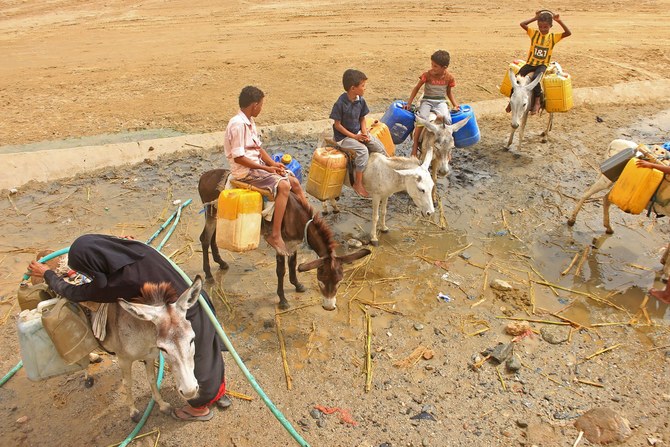Saudi authorities on Tuesday announced a $1.2 billion package of aid for Yemen’s internationally recognized government.
It will help boost the country’s struggling economy, pay salaries and improve food security, and reflects the Kingdom’s desire to help achieve security, stability and development in Yemen, the Saudi Press Agency reported.
The economic assistance was provided in response to a request by the Yemeni government for help to address its budget deficit, it added.
Mohammed Al-Jaber, the Saudi ambassador to Yemen, and Salem bin Breik, the Yemeni finance minister attended a signing ceremony for the aid package in Riyadh.
“The aid will contribute to supporting the Yemeni government in covering salaries, wages and operating expenses,” the Yemeni minister said.
“The support will also have a significant impact on ensuring food security in Yemen, and highlights the Kingdom’s permanent support for Yemen.
“The new economic support is an extension of a long series of developmental and economic support provided by the Kingdom for decades, and an important response to addressing the Yemeni government’s budget deficit.”
During the period from 2012 to 2022, Saudi Arabia deposited $4 billion in Yemen’s central bank to help improve the daily lives of the people of Yemen, according to the SPA.
The integrated support from the Kingdom has helped improve the financial and economic situation in the country, it added, mainly through the effect it has had on the exchange rate of the Yemeni riyal, which has helped to improve the lives of Yemeni citizens by stabilizing food prices, improving purchasing power, reducing inflation and increasing expenditure rates.
The Kingdom has played an important role in stimulating economic growth in Yemen by providing grants for fuel derivatives, with the aim of ensuring electricity is provided in all of Yemen’s governorates.
In 2021 and 2022, the total amount of oil derivatives provided was about 1,260,850 tons, with a value of $422 million, which helped ensure more than 70 power stations could continue operating.
Through the Saudi Development and Reconstruction Project for Yemen, the Kingdom has implemented 229 development projects and initiatives in 14 governorates since 2018, covering seven sectors: education, health, energy, transport, water, agriculture, fisheries and government institutions. In addition it has launched projects to improve infrastructure, essential services and the creation of jobs.
















